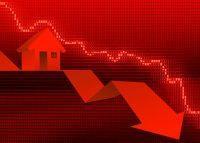Following a brutal week that saw trading on the New York Stock Exchange halted twice while the Dow Jones Industrial Average’s 11-year bull run came to an end, real estate stocks took a beating as well — but some much more than others.
The SNL U.S. REIT Equity index ended Thursday down 18.7 percent from the start of the week, while the S&P 500 fell 16.5 percent as concerns about coronavirus, economic disruption and tanking oil prices swept markets worldwide.
Stocks recovered somewhat on Friday after President Donald Trump declared a nationwide state of emergency in the U.S, and the S&P 500 is now down 10 percent from where it was last Friday.
“Over the last few weeks, REIT performance has been in line with the broader sector — we were down just as much — which was a bit of a surprise since it goes against the sense of REITs as a safe haven,” said Haendel St. Juste, a REIT analyst at Mizuho Securities USA.
“But there has been significant dispersion in sub-sector performance, and malls and hotels are really getting hurt,” he added.
Returns for lodging and resort REITs are now down 53 percent since the start of 2020, making it the worst-performing sector by a significant margin, according to the latest data compiled by Nareit. Regional malls were the second-worst performers, down 41 percent so far this year.
While long-term leases tend to provide a buffer for most real estate firms, the day-to-day nature of the hotel business means the impact of the pandemic is reflected in near real time. But other sectors aren’t immune.
“We like to remind people that REITs have longer leases, but underlying tenant credit does matter,” St. Juste said. “And people are concerned about the economic impact on those tenants.”
Read more


The real estate sectors least impacted by recent market turmoil were infrastructure, data centers and self storage, with performance declines of 1, 2 and 7 percent since the start of the year.
Residential real estate has also emerged as a safe haven for REIT investors, since demand for housing is much less flexible — although the multifamily sector has fared somewhat worse than single-family rentals.
“If you’re a single adult living in Manhattan, or Nashville, and you’re worried about your job, you might take on a roommate or move in with mom and dad,” hence reducing demand for apartments, St. Juste said. “But if you’re a family living in a single-family suburban house, it’s harder to do that.”
Returns on apartment REITs are now down 14 percent for the year, while single-family homes are down 10 percent.
After hotels and malls, another sector endangered by the spread of the new disease is senior housing and nursing homes. In Washington State, the virus has already impacted 11 facilities and led to restrictions on visitors.
“There’s now this real concern that if there’s more of a freak-out in these types of facilities, they could empty out really quickly,” said REIT analyst Omotayo Okusanya, also at Mizuho.
On Wednesday, Sabra Health Care REIT saw its stock price drop by 14 percent in one day after a COVID-19 outbreak was reported at one of its facilities near Seattle. Health care REITs overall — which include not only nursing homes but also better-performing medical office buildings — are now down 36 percent since the start of 2020.
Although the affected nursing home was just one of Sabra’s hundreds of assets, “the stocks are clearly pricing in a scenario where they think the majority of the portfolio is going to get impacted by this issue,” Okusanya said.
Economic issues other than coronavirus are also putting downward pressure on some real estate firms. The collapse in oil prices — which triggered the first market selloff on Monday — may present problems for REITs with assets in Houston or Oklahoma City, Okusanya said.
Meanwhile, historically low interest rates might not turn out to be the boon they’re often thought to be.
“Low interest rates are generally very good for REITs, but the problem we have at this point is that while the 10-year has come down, spreads are actually widening,” said Okusanya.
“Lenders are starting to be more selective,” St. Juste added. “The lower the 10-year goes, the more people are concerned about a recessionary scenario.”
In particular, firms with major development or acquisition plans in the pipeline may have to scale back their growth targets if the cost of capital rises. Health care and triple-net retail REITs were particularly acquisitive prior to the present crisis, Okusanya said.
On Thursday, entertainment venue landlord EPR Properties withdrew its earning guidance and deferred a planned $1 billion investment in a gaming venue, citing market conditions. The company’s stock has fallen by 45 percent since the start of the week.
Uncertainty in the market remains high, in large part due to uncertainty around the pandemic itself.
“People are trying to connect the dots — how much worse could this get, how long could it last?” said St. Juste. “If we knew that, we could probably more widely extrapolate some answers.”
